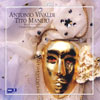Vivaldi Tito Manlio
Two Vivaldi champions go head-to-head
View record and artist detailsRecord and Artist Details
Composer or Director: Antonio Vivaldi
Genre:
Opera
Label: Astrée Naïve
Magazine Review Date: 4/2006
Media Format: CD or Download
Media Runtime: 185
Mastering:
Stereo
DDD
Catalogue Number: OP30413

Tracks:
| Composition | Artist Credit |
|---|---|
| Tito Manlio |
Antonio Vivaldi, Composer
Accademia Bizantina Ann Hallenberg, Servilia, Mezzo soprano Antonio Vivaldi, Composer Barbara di Castri, Decio Christian Senn, Lindo Debora Beronesi, Lucio Karina Gauvin, Manlio, Soprano Marijana Mijanovic, Vitellia, Contralto (Female alto) Mark Milhofer, Geminio, Tenor Nicola Ulivieri, Tito Manlio, Baritone Ottavio Dantone, Conductor |
Composer or Director: Antonio Vivaldi
Genre:
Opera
Label: CPO
Magazine Review Date: 4/2006
Media Format: CD or Download
Media Runtime: 195
Mastering:
Stereo
DDD
Catalogue Number: CPO777 096-2

Tracks:
| Composition | Artist Credit |
|---|---|
| Tito Manlio |
Antonio Vivaldi, Composer
Antonio Vivaldi, Composer Bruno Taddia, Lindo, Bass Davide Livermore, Geminio Elisabeth Scholl, Manlio Federico Maria Sardelli, Conductor Lucia Sciannimanico, Servilia, Mezzo soprano Modo Antiquo Nicki Kennedy, Lucio, Soprano Rosa Dominguez, Vitellia Sergio Foresti, Tito Manlio, Bass Thierry Grégoire, Decio |
Author: David Vickers
Some names may appear familiar from Metastasio’s La clemenza di Tito but in fact these characters and their story are totally different (and more morally ambiguous than the principled Metastasio would have liked). Instead of a benign Emperor torn between friendship and duty, Vivaldi’s Tito is a villainous consul who threatens to have his daughter Vitellia dragged naked through the streets of Rome because she refuses to swear a vow of hatred against his enemies clamouring to be fairly represented in the Senate. The climax of the drama is when Tito condemns his son Manlio to death for having disobeyed an order, an injustice which provokes the Roman army to rise up and openly defy the tyrant.
Whether rapidly compiled or not, Tito Manlio is one of the Red Priest’s best stage works. Federico Maria Sardelli conducts the world premiere recording (it was released first in some territories and is an expanded version of a WDR recording that was issued by the Italian magazine Amadeus). Sardelli supervises copious heaps of recitative with sense and clarity, although the finest aspect of his performance is Modo Antiquo’s boldly accentuated characterisations, brought to life with virile colour.
The resonant church acoustic is too boomy for opera, but nonetheless gives the finely paced arias an attractive bloom. Sardelli captures all of the precocious orchestral effects in Vivaldi’s score. Manlio’s ‘Se non v’aprite al di’ is an assertive dramatic flourish that arouses colourful abandon from Modo Antiquo’s natural horns. Lucio’s ‘Combatta un gentil cor’ has bristling continuo and strings supporting a sunny trumpet solo. Cello solos, inventive continuo accompaniments, an astonishing funeral march and a breathtaking viola d’amore solo (in ‘Tu dormi in tante pene’) all contribute textural richness.
Two of Manlio’s arias are particularly outstanding: ‘Sonno, se pur sei sonno’ is a marvellously dark opening to Act 3, with pulsing, creepy string chords (although Elisabeth Scholl’s consonants are not clear enough); ‘Ti lascerei gl’affetti miei’ is a sublime moment of minor key melancholy that commences with only a pair of oboes and bassoon before evolving into a deeply moving lament of considerable beauty and sonority that is eloquently shaped by Sardelli. Alas, Sardelli’s performance is let down by singers who incline towards competence rather than distinguished brilliance.
Naïve’s Tito Manlio comes from a fine team of performers best known (unfairly) as Andreas Scholl’s backing band. Ottavio Dantone has tinkered a little with Vivaldi’s scoring and uses artificial means to make recitatives seem more varied (and orchestrated) than they really are, but his illuminating comments in the booklet are admirably honest. The Naïve recording has better sound than CPO’s, with finer clarity and immediacy.
Accademia Bizantina play superbly (the Overture is worth the price alone), and Dantone is no less theatrically flamboyant than Sardelli, but sometimes exercises more restraint and elegance. An aria-by-aria comparison shows Dantone to be more clinical, without plumbing emotional richness in key moments. Dantone’s horns are less robust and sound further back in the mix than Sardelli’s, although Dantone’s recitatives have a fraction more expression and intelligence. Unlike Sardelli’s uneven cast, Dantone’s singers are often fantastic – especially Ann Hallenberg, whose coloratura is simply gorgeous in Servilia’s ‘Liquore ingrato’ (dreamy, sensual, immaculately phrased and with remarkable intonation). Karina Gauvin gives a masterclass of the Baroque opera soprano’s art: versatile technique, flexible expression, beautiful cantabile and stirring passagework.
Perhaps Tito Manlio is Vivaldi’s London bus; after a long wait, two vehicles arrive together. The performance of each Italian group has its charms. Dantone’s performance, with superb singers generally in a class of their own, is comfortably on a par with the Vivaldi Edition’s finest achievements so far. However, Sardelli has penetrating things to say about Vivaldi’s orchestral ingenuity and Modo Antiquo play with greater depth of feeling. It would be unfair if Dantone’s fizzy brilliance eclipses Sardelli’s thoughtful team effort. Both versions should win Vivaldi’s operas some new friends.
Discover the world's largest classical music catalogue with Presto Music.

Gramophone Digital Club
- Digital Edition
- Digital Archive
- Reviews Database
- Full website access
From £8.75 / month
Subscribe
Gramophone Full Club
- Print Edition
- Digital Edition
- Digital Archive
- Reviews Database
- Full website access
From £11.00 / month
Subscribe
If you are a library, university or other organisation that would be interested in an institutional subscription to Gramophone please click here for further information.




